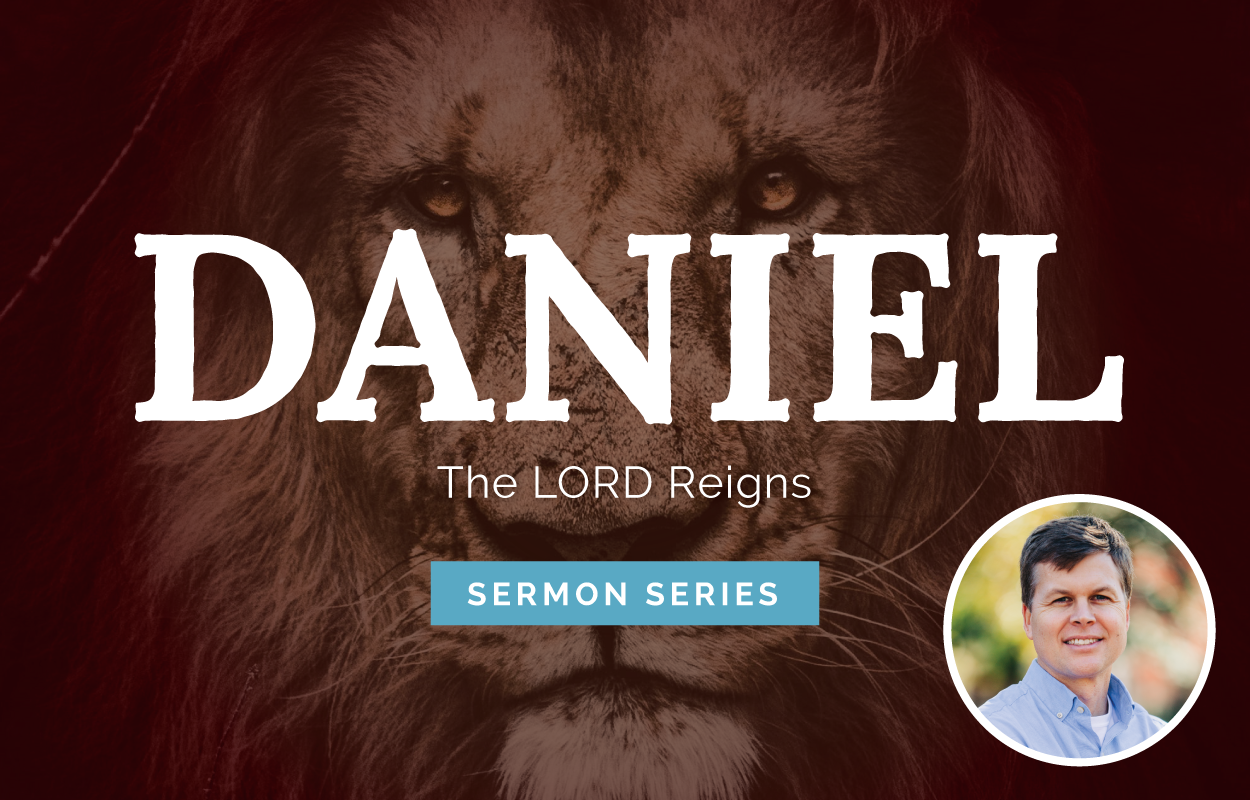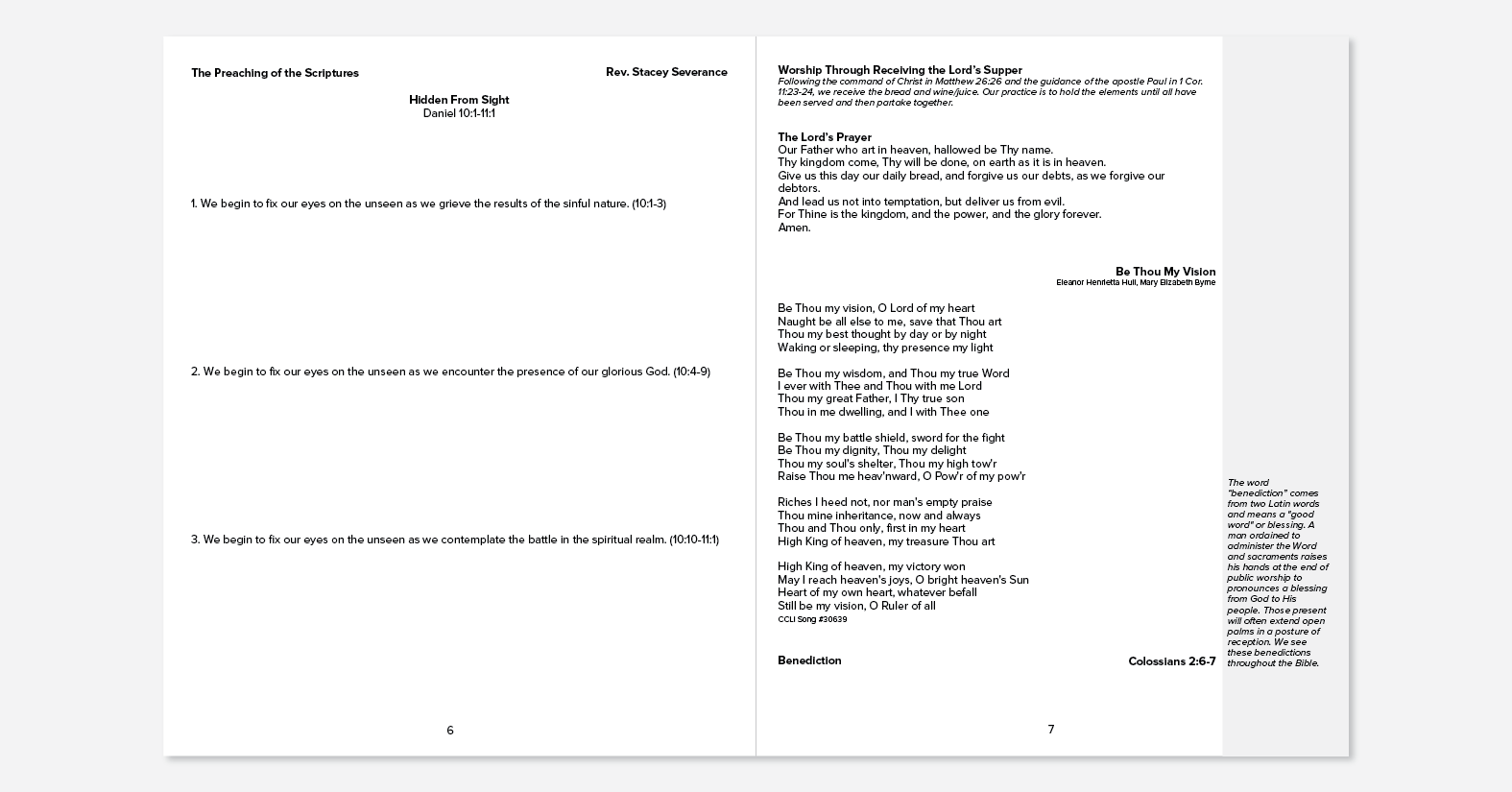Hidden From Sight - Daniel 10
No one would argue against the importance of faith in knowing God and following Jesus Christ. Faith is a basic component; it’s elementary, as vital to the Christian’s life as oxygen, water or food is to human life. Hebrews 11, in the NT, says “By faith we understand that the universe was created by the word of God, so that what is seen was not made out of things that are visible.”
The Scriptures teach that God made the universe by speaking. Christians believe this by faith. However, no matter what you believe about the creation of earth, you believe it by faith. How so? Well, what is faith? The writer of Hebrews says, “Faith is the assurance of things hoped for, the conviction of things not seen.”
By “conviction” he describes the inward belief produced when a person has proof. When you see irrefutable evidence of something, you have great confidence. Faith is that kind of confidence in what is hidden from your sight. Faith is a firm trust that what you hope for will come to be.
How important is faith to God? Well, Hebrews states that, “without faith it is impossible to please [God], [because] whoever would draw near to God must believe that he exists and that he rewards those who seek him. And Hebrews lists person after person in the history of redemption who acted on faith.
The preacher who wrote Hebrews, a piece which scholars think was originally a sermon, was compelling the churches to have faith in God and act on it. To believe in and place trust in that which is hidden from sight. He pleads with these first century Christians keep faith. Why?
Well, for one, their lives were very difficult, and two, trust in God does not come naturally. Our ability to have and act on faith is naturally undermined by what we see with our eyes.
God knows this, and out of His great love He has taken pity on us. He sent Jesus Christ to earth, among other things, to live by faith. Jesus lived with his eyes fixed on what is unseen. He trusted the will of God the Father in the place of His people. Jesus fulfilled all of God’s righteous requirements, including faith. Repeated the Scriptures say, “The righteous will live by faith.”
And so if we would follow Jesus, if we would call Him our Savior and Lord, like Jesus we must fix our eyes on what is hidden from our sight. The apostle Paul wrote that in walking by faith, ”we look not to the things that are seen but to the things that are unseen.”
But how do we fix our eyes on what is hidden from our sight? How do you constantly look at something that you cannot see. We see three things demonstrated in Daniel 10 that help us. You can find them printed in the WG. We begin to fix our eyes on the unseen as we grieve the results of the sinful nature, as we encounter the presence of our glorious God, and as we contemplate the battle in the spiritual realm. Let’s look together at each one.
In recent weeks we’ve looked at the visions that God gave to Daniel. Each one stands alone and carries deep meaning. In chapter 7, God shows that He is the greatest king of all time. In chapter 8, God gives a long view of history, encouraging faithfulness even as evil appears to triumph.
In chapter 9, Daniel learns that 70 years in Babylon was not enough for God to deal with completely with sin, and there would be a longer period after which God would send His Anointed One, One who would “put an end to sin,” who would “atone for iniquity” and “bring in everlasting righteousness.” This Anointed One would also “seal both vision and prophet,” thereby completing God’s revelation to His people.
Jesus Christ is that Anointed One. He is the final word of God, He is the atoning sacrifice, He is the righteousness of God’s people. He puts an end to sin. And here, in chapter 10, God adds something new, because a wonderful thing had occurred. In the year 538 B.C. King Cyrus of Persia allowed the Jews to return to Jerusalem to rebuild their temple.
But by 537, just one year later, the year in which this vision was given, the temple reconstruction project was in jeopardy. The OT book of Ezra gives account of this. There were some who did not want to see the temple re-established and blocked the work. Apparently those against the rebuilding came from the area known as Samaria. They were Samaritans, and their conflict with the Jews continued to the time of Jesus Christ.
The stoppage of the temple rebuilding, along with the pitiful state of Jerusalem and the sinfulness of the Jewish people, caused Daniel to enter a period of mourning. He wouldn’t eat much, didn’t make himself physically presentable, he was downcast; it is a description of a person mourning a death.
And the time of year stated in verse 4 indicates that Daniel was doing this during the time of the Jewish Passover and the Feast of Unleavened Bread. These were big celebrations. But it was not time to party. It was time to pray. This isn’t the first time we’ve seen Daniel deny himself food and drink as He sought the face of the living God. Daniel prays with fasting and he grieves the sin that has ravaged the people of God.
Do you ever find yourself exasperated, depressed, weary in your circumstances, and so you indulge in food and beverage? You try to dampen your sorrow or find some sense of satisfaction in eating or drinking or both. This has become something of a joke in our modern culture. Got a problem? Need beer, need liquor, need wine. People put this on shirts and in picture frames. Ever want “comfort food?” Ever heard of “eating your feelings?”
Have you considered that the emptiness you aim to fill can actually be filled by the God who made you, the God who knows what you need? There’s a time to enjoy rich food and drink that the Lord provides, but there is also a time to put those things aside.
For true worship to come from within us, we must grieve the sinful nature’s effects on the world and deny ourselves the temporary pleasures of this life from time to time. Only then can we begin to fix our eyes on what is unseen and eternal.
Listen to me, parents: if you do not seek for the Lord to fill you up, you will put an unhealthy hope in your children and an expectation for them to fill you up. Listen to me, college students: if you do not seek for the Lord to satisfy you, you will look to money, success, popularity, romantic love -- all of which, in themselves, are not bad things. But you must look to what is unseen, and then you will see those things rightly.
This goes for every group represented here today, from the very young to the very old. Always attempting to fill your emptiness with things of this world, always trying to dull your pain with what can be seen or touched or tasted, and never putting aside the good things we can enjoy in order to be filled by God keeps us from seeing the unseen. Daniel was not just self-disciplined; he was hurting. He denied himself temporary pleasure in order to fix his eyes on the eternal, because there lies our lasting hope.
Now what comes next for Daniel is a vision. You shouldn’t feel robbed that Daniel saw this but you have not. Even the men who were with Daniel did not see it. But though we have not seen something like this, we have this record of it preserved through the ages. For enabled by the Holy Spirit of God to discern the truth of this account, we are blessed by it.
What Daniel sees is a spectacular theophany, a manifestation of the divine. The Scripture does not specifically say that the man was Jesus, though many believe it to be. There is a strong argument to be made that it is God the Son whom Daniel saw. Some think it was an angel, but either way Daniel undoubtedly glimpses the glory of God. Daniel has a heavenly encounter. He experiences the presence of the one true Godin a way that he could later describe for God’s people, including us today.
It is sometimes thought that faith in the triune God and relationship with Him simply intellectual. Certainly there is a richness in the tenets of the faith, in the doctrine; but the knowledge of God includes experience. This is why, often, people try to create an experience, perhaps by setting a mood in a worship service, or through a certain kind of music or singing or lighting. The goal is to get into a position to experience God.
But we don’t conjure up God. We don’t generate an encounter with Him or have control over it. But we do need the encounter. What could be overlooked here is Daniel’s own love for and pursuit of the holiness of God. Daniel was disgusted with all things sinful and ungodly. Like Abraham, and Moses, and others, Daniel was no doubt special in the plans of God as far as what he experienced. But his experience with the divine should cause us to look deep within ourselves.
Daniel was standing by the Tigris River; he was not in some high-tech worship environment. God created the experience. God saw what Daniel valued and loved and lived for. And God drew near to Daniel. We should look at what we love and what we live for that we might encounter the presence of our glorious God and begin to fix our eyes on the unseen.
We should carve out time, put away the devices, put away the To-Do lists, and give ourselves to being alone with God. Earlier in Daniel, it says that he pulled away to pray throughout the day. Also, we should pursue the holiness of God in our daily lives. Determine to delight yourself in God and His righteousness.
God loves holiness. He is passionate about it. When we are passionate about it as well, we can expect something even better than beholding a holy vision with our eyes; we can expect to behold our holy God with our hearts. As we encounter God in this way, we begin to fix our eyes on what is unseen.
Now, in these remaining verses, what Daniel describes as “a great conflict” in verse 1 becomes clear. The great conflict is going on in the spiritual realm. More vision is yet to come, and we will see it in the coming weeks with chapters 11 and 12, which form a unity with this chapter, but first God has decreed that Daniel know more about the evil spiritual powers influencing those who conquer and control the nations.
This divine being, “one having the appearance of a man,” gives Daniel insight into the spiritual world. The side of good has their warriors or chiefs in battle - their “princes” - and the side of evil has theirs. They war with one another in the heavenly realms.
The apostle Paul reiterates this in the NT. He says, “We do not wrestle against flesh and blood, but against the rulers, against the authorities, against the cosmic powers over this present darkness, against the spiritual forces of evil in the heavenly places.” Good and evil are at war. Light and darkness clash like gladiators in an arena hidden from our sight.
If we would begin to fix our eyes on the unseen, then we must contemplate the battle going on in the spiritual realm. Notice the compliments lavished on Daniel in this passage of Scripture. Verse 11, “man greatly loved.” Verse 12, he set his heart to understand and humbled himself before God.
Why is Daniel described this way? Because he continually picked up the weapons of spiritual warfare and fought with faith Daniel fought with the weapons of prayer and fasting and mourning over sin as one who believed in the spiritual realm. Daniel fastened on the belt of truth; he put on the breastplate of righteousness. He took up the shield of faith. He put on the helmet of salvation, and he carried the sword of the Spirit, which is the word of God, and he prayed. He prayed for the people of God.
Friends, we must consider who it is that we truly war against. We must consider who it is that wars against us. The apostle Peter told the churches, “Be sober-minded; be watchful. Your adversary the devil prowls around like a roaring lion, seeking someone to devour. Resist him, firm in your faith.” We fight a spiritual battle. This was essential for Daniel to understand as he sees the vision of chapter 11 and 12. We will take that on next week.
But as we go to the Lord’s table this morning, as we hold in our hands these visible elements representing things hidden from our sight, Daniel’s experience here helps us. How so? Daniel grieved the results of the sinful nature, but he did not do so perfectly. He was a sinner.
But Jesus did perfectly grieve and hate sin. Jesus grieved sin unto death. Yes, Daniel encountered the presence of God, but not fully. Jesus, however, encountered the divine like no other, rising from death to immortality. And while Daniel had some grasp of the battle in the spiritual realm, Jesus had a full grasp.
Matthew 4 in the NT describes how Satan tempted Jesus, and Jesus fought with truth and faith. Jesus despised sin, He loved the holiness of God, and he saw through the allure of worldly fame, power, riches, and pleasure; and He resisted. And so Jesus alone is our worthy Savior.
He fixed His eyes on what was unseen, and so we must fix our eyes on Him. Do you believe?
He calls us to deny ourselves and follow Him. Have you trusted in Him? He reveals all our sin and shame, so that none can be called “good.” Have you turned from your sin to embrace Him?
Do you think you need to see Him with your eyes? Do you doubt He is risen? Do you doubt He is God?
The apostle Thomas, who followed Jesus during His earthly ministry, heard that Jesus had risen, but he doubted. But then Jesus came and appeared to him. And Jesus said to Thomas, “Put your finger here, and see my hands; and put out your hand, and place it in my side. Do not disbelieve, but believe.” Thomas answered him, “My Lord and my God!” Jesus said to him, “Have you believed because you have seen me? Blessed are those who have not seen and yet have believed.”
Please bow with me in prayer.





